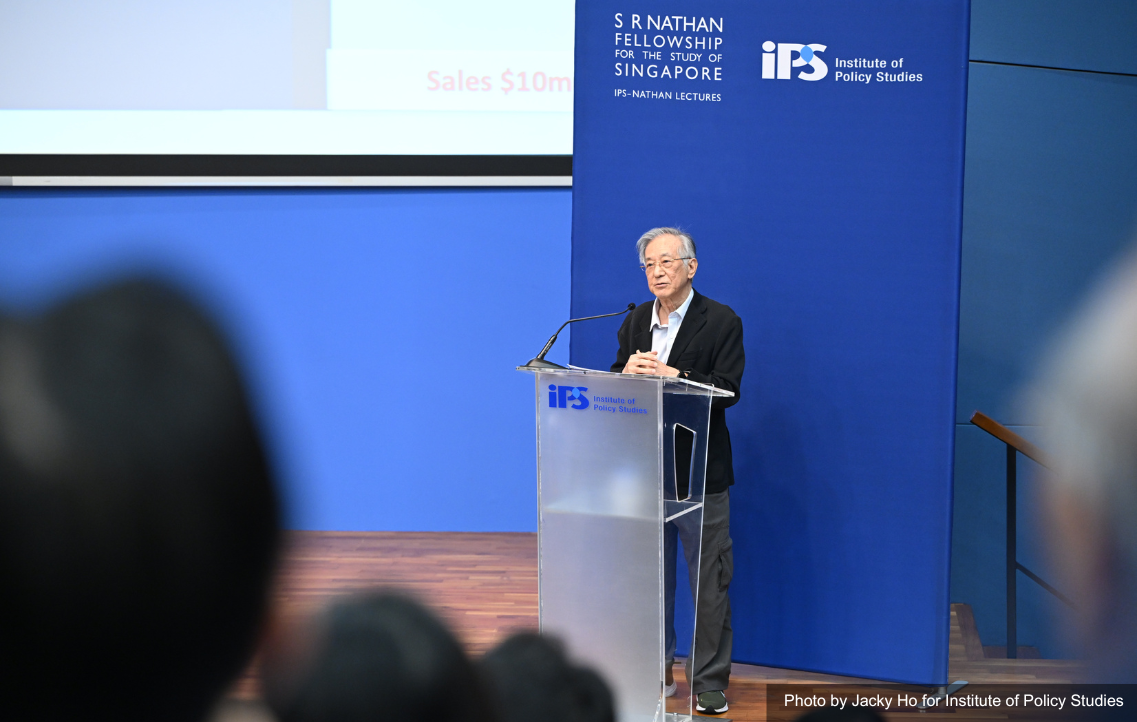
Mr Philip Yeo, the 16th S R Nathan Fellow for the Study of Singapore, delivered his third and final lecture as part of his lecture series, “Neither Civil Nor Servant: Singapore’s Disruptive Economic Playbook”.
Held on 16 June 2025, the lecture titled “Singapore Enterprises: Grow, Glow, Globalise” explored the pivotal role of local enterprises in Singapore’s economy. Mr Yeo traced the evolution of the enterprise ecosystem and outlined a forward path for Singaporean companies to scale up and expand globally.
Grow, Glow, Globalise: A Framework for Singaporean Enterprises
Mr Yeo opened by explaining the core principles guiding enterprise success: Growth, he emphasised, is essential because without expansion, companies will stagnate. To “glow” is to be profitable, he added, which enables companies to stay viable. Most importantly, Mr Yeo noted that Singaporean companies must venture beyond national borders to achieve true scale and to globalise.
He explained that Singapore’s initial economic growth was propelled by industrialisation and by attracting multinational corporations (MNCs) that provided subcontracting opportunities for local enterprises. However, he stressed the importance for local companies to evolve beyond being mere subcontractors and to develop proprietary products.
Enterprise Transformation: Four Priorities
To thrive, local companies must focus on four key areas of transformation: digitalisation, acquiring new know-how, developing innovative products and services, and, critically, enhancing human capital. “For any company that wants to grow, human capital is a key function of a good CEO,” Mr Yeo emphasised.
Evolution of Singapore’s Enterprise Ecosystem
He recounted the strategic establishment of SPRING and its eventual merger with IE Singapore to form Enterprise Singapore, which supports business expansion, human capital development, and financing. These agencies laid the foundation for small and medium enterprises (SMEs) to grow, glow and globalise by providing support in four key areas: management, money, markets and know-how.
Navigating Challenges
Mr Yeo noted key challenges facing Singaporean companies, including persistent tariffs, particularly the 10% baseline tariff from the US, which necessitates the development of new know-how and superior products. He also highlighted demographic shifts and limited manpower as significant hurdles, reinforcing the imperative for Singaporean companies to globalise to avoid stagnation.
Q&A Highlights: Key Discussion Takeaways
Moderated by Ms Aw Kah Peng, Chairman of Shell Companies in Singapore, the lively Q&A session tackled issues ranging from education and talent, to risk-taking, global expansion and the evolving role of government.
On talent and overseas exposure
Responding to concerns about the education system and global readiness, Mr Yeo stressed exposure and risk-taking. He recounted his policy while serving as EDB chairman, where he would send young officers overseas after their first two years in the office, forcing them to learn to survive. “Maybe our SMEs must have the confidence to use their young officers, motivate them and send them out to learn the hard way,” he said.
Leveraging regional talent
Discussing challenges in hiring for overseas expansion, Mr Yeo was pragmatic: “So the only way for a company to grow is for its population of talent to become regional. You must hire Indonesians, Vietnamese, Malaysians, whatever you have, even Chinese…. For us to grow [SMEs regionally], we must prepare to recruit local talent, train them in whatever way we can, and send them back.” He also advised, “If I were a young man in a small SME, besides Mandarin, the other language I would learn is Bahasa. I can use it in Malaysia, and I can use it in Indonesia.”
F&B and technology
On Singapore’s capacity to produce large F&B and tech companies, Mr Yeo suggested focusing on packaged food for export, noting that Singapore food offerings like “chicken rice and Prima Taste’s packaged food have successfully travelled overseas.”
On technology, he reflected on Pacific Internet’s expansion and mentioned companies like Crimson Logic. He also spoke about the unpredictable promise of AI: “AI will be like the old internet…. It will reduce jobs.”
Governance and risk culture
On calibrating government support, Mr Yeo pointed out that in Singapore “we have a tendency where everything is handled by the government — the government takes care of you, the government does everything for you. And that actually doesn’t really help us.” He encouraged more risk-taking, drawing lessons from Switzerland and Scandinavia: “In Switzerland, with 8 million people, there’s essentially no domestic market, but they have the advantage of Europe.” He highlighted the need for Singapore to expand regionally and leverage the markets of neighbouring countries.
Gross Domestic Product (GDP) versus Gross National Income (GNI)
Questions were raised about how to measure the success of Singaporean companies with most operations abroad. GDP primarily measures economic output produced within a nation’s borders, regardless of who owns the business, meaning it does not fully capture revenue generated by Singaporean owned companies that operate overseas.
Mr Yeo replied: “If ownership is here and headquarters are here, we can aggregate all the income and earnings here…. So we will have to change how the government measures GDP versus GNI.”
Conclusion
Mr Yeo’s lecture underscored that a vibrant enterprise ecosystem depends not just on government support but on developing sustainable financing mechanisms, robust networks, and a mindset ready to seize global opportunities. As Singapore confronts demographic shifts, stiff international competition and a rapidly changing technological landscape, Mr Yeo’s closing message was clear: local companies must remain ambitious, innovative and outward-looking if they are to continue to “grow, glow, and globalise.”
Click here to watch the video of the lecture.
